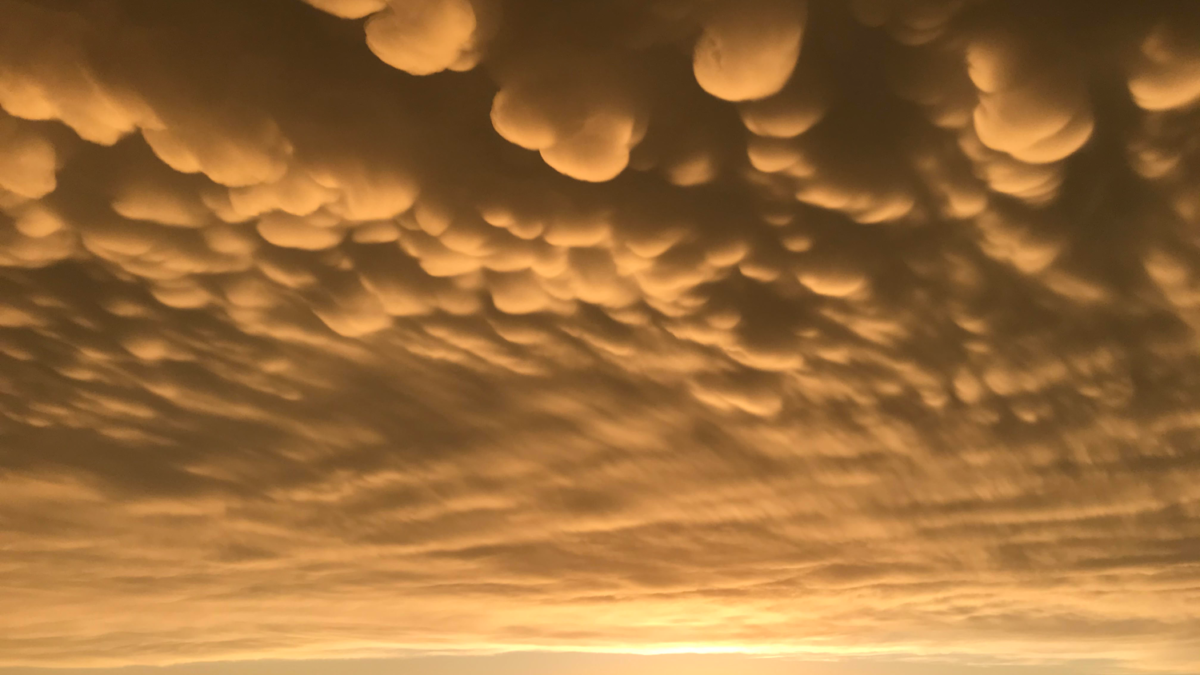Podcast: Play in new window | Download
When storms roll across my home state of Oklahoma, residents here have a few common reactions.

First, we listen to the weather station. Oklahoma has the best storm-tracking radar systems in the world. Second, we check our storm closets or shelters to make sure we have a good place to hide if severe weather turns to tornado warnings. Third, we step outside to look at the clouds – an Oklahoma tradition that surprised me when I first moved here, but I now I’m like everyone else.
Finally, we take shelter at the appropriate time, and when the storms pass, we go back outside to look for cool cloud formations or rainbows. The photo above is one I took after a recent storm. The colors and clouds were so stunning!
As I think about my state’s storm season, I’m reminded that we also have school traditions this time of year. This season normally includes field trips, baseball games, soccer matches, proms and graduation ceremonies. But this spring 2020 none of those traditions are common. The COVID-19 pandemic has left us with a storm of changes for which we had not prepared any common practices.
In this week’s podcast episode, Principal Jen Schwanke and I continue a conversation about leading from a distance. We discuss what it’s like to be a school leader in a time where norms seem to be constantly changing.
Here’s a summary of topics we cover together:
What are you doing for self-care?
Starting something new is always hard. Jen explains how caring for horse reminds her that when things get difficult, you pull her up, adjust, and start over. As you are managing school and your own self care during these closures, take time to stop, adjust and start over as needed.
How are you helping teachers adjust?
Just as you have had to adjust to a new normal, your teachers (especially those with small children or dependent loved ones) have an especially difficult task. So give them permission to be flexible and be okay with what is possible, not what is perfect.
Right now the mental health of your staff and students supersedes their academic progress. At the same time, there are lots of resources to support your teachers in preparing and creating diversified, differentiated instruction.
Give yourself and others plenty of grace.
Just like you are helping others accept a new norm, stop trying to everything perfectly. Find what works for your situation, talents, gifts and resources available, and do what works for you! When working with your community, show them grace too.
Ask parents what works for them. Keep expectations fluid and rubrics flexible. It’s not the student’s fault this is happening. So this cannot be punitive.
What about the gaps in learning?
Stressing about the gaps is not giving your students or teachers enough credit for their resilience and ability to still learn. Let go of what you can’t control. Instead of worrying about what is next, focus your energy on what is happening now.
Yes, you have to plan ahead as a leader, and you will face learning gaps when the time is appropriate. But don’t underestimate the abilities of your teachers to remediate and students to catch up when we again have the opportunity for face-to-face instruction.
Let’s Wrap This Up
Last night as I stood in my neighborhood watching storm clouds pass overheard, I was not in control of the raging winds and weather patterns. We took shelter at the appropriate times, and we observed with wonder the awe and beauty of nature after the storms had passed.
As you continue leading from a distance during school closures, keep in mind what you can control and what you cannot. Keep inspiring others by taking of yourself, give others plenty of grace, don’t fret over the gaps in learning you cannot currently change, and trust your teammates. In time, we will return to some sense of calm after the storm.
Now It’s Your Turn
What is one way you can remind your teachers that you value and appreciate them while allowing for flexibility in their own performance from a distance? As we look at Teacher Appreciation Week beginning May 4, what is a creative way you can encourage your teachers to keep their self-care a priority while serving others?


